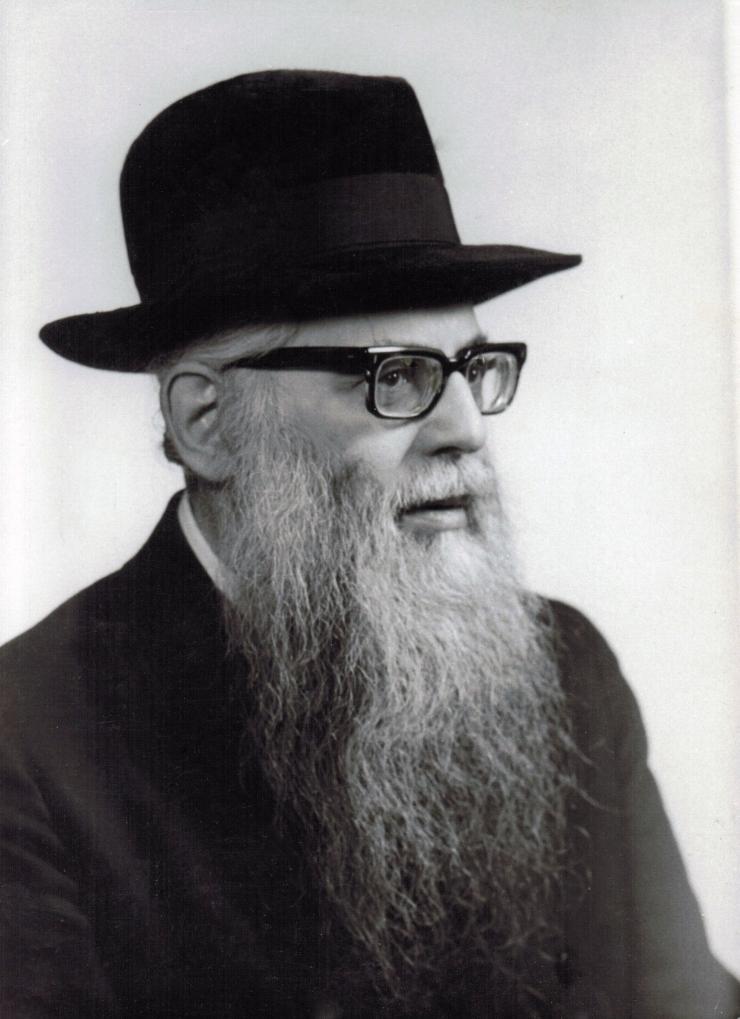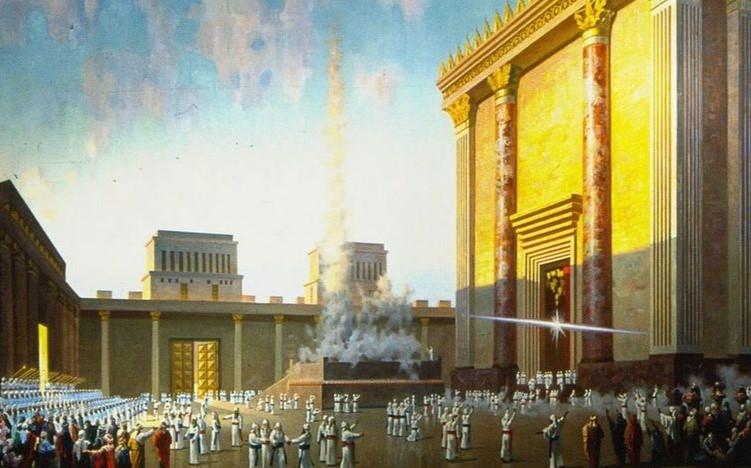Why Was a “Zecher” Not Established For Hakhel?
The Rebbe and Harav Mordechai Savitzky of Boston discussed a variety of topics, among them the mitzva of Hakhel. We present here a translated transcript from the Yiddish conversation that was recorded on tape • From Hatomim Magazine • Full Article
From the new Hatomim Magazine , for Yud Shvat 5783, Download it here for free
Harav Mordechai Savitzky was an alumnus of the Chafetz Chaim’s Yeshiva in Radin and a musmach of Vilna’s famed rav, R’ Chaim Ozer Grodzensky. As a young bachur, he corresponded with the Rogatchover Gaon and published this correspondence in one of his many sefarim. After arriving in America from war-torn Europe in 5699 (1939), he was appointed av beis din and rabbi of Boston, a position he held for more than forty five years. In the United States, he formed a special bond with the Rebbe Rayatz and later with the Rebbe Melech HaMoshiach.
After recovering from a severe medical condition, he came to 770 on 4 Kislev 5748, Shnas Hakhel, to thank the Rebbe for davening for him. After Mincha, the Rebbe requested that they “talk in learning” which they did in “Gan Eden HaTachton,” the hallway outside the Rebbe’s room.
The Rebbe and Harav Savitzky discussed a variety of topics, among them the mitzva of Hakhel. We present here a translated transcript from the Yiddish conversation that was recorded on tape.
*
[After mincha, Rabbi Savitsky approached the Rebbe Shlita and gave him “Shalom Aleichem”. The Rebbe apologized for not making adequate preparations for his visit and added that it is not possible to enter his room, but they can talk in learning near the room “because when two Jews meet they should talk in learning.”]
The Rebbe Shlita: Since the matter of “Hakhel” was mentioned, and considering the extent of the fondness for this matter — this year being “the year of Hakhel” — there is a question that I have been bothered with for some time:
The mitzva of Hakhel only is in effect while the Jews are on their land, but after the destruction of the Beis HaMikdash and the Jews being exiled from their land, the mitzva is void. But why was a ‘zecher’ (remembrance) not established for Hakhel (in the Mishna and Beraisa, or among [the works of] Gedolei Yisrael over the generations) in the same way we observe a “zecher l’Mikdash” in several matters, even matters of practical customs and actual Halacha.
In our case the question is stronger: the mitzva of Hakhel is (to quote the Sefer HaChinuch) “a strong pillar and a great honor for religion” – then surely they should have established a memorial for Hakhel, if such ‘zecher l’Mikdash’ acts were established for particular mitzvos!?
There is a kuntres that appeared in Yerushalayim with many answers to this question, but I still haven’t found an easy and simple explanation that isn’t “lomdus.” An answer to this question ought to be understandable and suitable for all those included in the “Hakhel” – men [as well as] women and children!
Rabbi Savitsky: Perhaps the reason for this is because at this time “there is no king in Israel”.
The Rebbe Shlita: According to many commentaries “At a time when there is no king … the greatest of the Hakhel reads [the Hakhel Torah-reading, which can mean] either the “greatest in his generation” or “the greatest in Israel” or the greatest in that particular crowd of “men, women and, children.”
Rabbi Savitsky: Maybe because we are not in Eretz Yisrael.



Harav Mordechai Savitzky
The Rebbe Shlita: This only explains the fact that we do not do a “Hakhel” in the Beis HaMikdash. But now in the Diaspora —even if we’ll claim that there is no king and not even a “greatest in his generation” — the question arises: after all, the purpose and the goal of Hakhel exist now too; Namely – “so that they may hear and learn and fear Hashem their G-d and observe to do all the words of this Torah.” Why then should there not be a ‘zecher’ for this just as we have such a ‘zecher’ for many other [Beis HaMikdash] observances?
More so:
The Alter Rebbe writes in his Shulchan Aruch (regarding the prayer for rain in Eretz Yisrael which begins on 7 Mar-Cheshvan, “fifteen days after the festival so that the last of Israel will reach his home and the rain should not stop him”) that “after the churban, they would gather from all the Yerushalayim suburbs for the pilgrimage as is still done today. Therefore, the Sages did not change the practice of asking for rain only after 7 Mar-Cheshvan in Eretz Yisrael.”
We see then, that – at least at certain times – there was a ‘zecher’ for the Aliya l’regel. Why then does Hakhel not deserve a ‘zecher l’Hakhel’?
Rabbi Savitsky: Perhaps Simchas Torah is a kind of Hakhel?!
The Rebbe Shlita: This is indeed what the Abarbanel writes: “Hence the custom remains these days that on the eighth day of Sukkos — Shemini Atzeres — which we call the day of Simchas Torah for on that day we complete the Torah, the greatest person in the congregation rises and completes it, and he himself reads the potion of V’zos Ha’bracha without an interpreter to imitate the king at that time [at Hakhel].”
However, his words are very questionable according to Nigleh. It is a great chiddush to say that what in the Torah Sheb’ksav is required to take place on “the festival of Sukkos” — which in Torah Sheb’al Peh is interpreted to mean at the start of the festival and at the very least no later than Chol HaMoed — according to him – takes place after Shemini Atzeres, the other extreme [of the date written in the Torah]!
Rabbi Savitsky: If it would be done on Chol HaMoed, it might be misrepresented as indeed what actually happened in the Beis HaMikdash and not just as a ‘zecher’. An example of this: Rosh Hashana and Yom Kippur are also a ‘zecher’ for Yovel, but they are not observed exactly as they were back then so as not to have people consider it Yovel itself!
The Rebbe Shlita: Firstly, we are after all discussing also Jews in the Diaspora, and secondly, that claim proves the opposite: Rosh Hashana and Yom Kippur are observed on the same day that they were observed back then, while here — according to the Abarbanel — they changed the day?!
And as was mentioned, just as one makes a ‘zecher’ in many matters,
— e.g., on the Seder night one of the signs of the seder is “Korech”, which is a “remembrance to the Beis HaMikdash;” we reenact how Hillel [observed the mitzva of Korban Pesach] by sandwiching the matza, maror, and Korban Pesach and eating them together. Therefore, matza and maror must be wrapped together as a “remembrance for the Beis HaMikdash” –
why should they not make a “zecher” for Hakhel”?! –
If you find a suitable explanation for this question, I’ll be very satisfied.
* * *
Here, it must be clarified that all the questions and discussions are only about making a ‘zecher for Hakhel’ [with uniqe practices] the way other “zecher l’Mikdash” practices are done. But when it comes to “congregating communities in Israel” – simply gathering Jews (in gatherings of men, women, and children) and instilling in them Yiras Shamayim – then all the discussions and debates don’t matter: action is the main thing.
And as you can see in reality: wherever Jews are gathered and you talk to them about Jewish matters — not necessarily in the year of Hakhel, but also on Shabbos (as per the Jewish custom cited as a ruling in the Shulchan Aruch which calls “to gather gatherings every Shabbos”) and on Yom Tov and on every appropriate occasion — and encourage them to strengthen themselves in practical Jewish observance, then “words that come from the heart” do their work and leave an impression and fulfill within listeners the goal and purpose of Hakhel — “to fear Hashem.”
The situation in America is the greatest proof of this: the sermons delivered by the rabbis before “Yizkor” have accomplished worlds-full of good effects. There are many who without these sermons would have nothing to do with Jews and Yiddishkeit – even [to something as simple as] answering “Amen” etc.
When a Jew comes to the shul to recite “Yizkor” on Yom Tov and undertakes to give charity and answers “Amen Yehei Shmei Raba” while saying the Kaddish (before or after “Yizkor”) — this makes an impression on him (and even if he was to wish he could forget it, his son would make sure to remind him…)!
Rabbi Savitsky: My argument has been, for a long time, that when reaching out to a Jew to bring him closer to Torah and mitzvos, we should mainly teach him practical mitzvos. “Don’t forget your mother’s teachings”…!
The Rebbe Shlita (smiling): I see that the fact that you daven in the Nusach Chabad had a huge effect on you. After all, you see what it says in the Chabad books. This is the correct approach, which avoids [unnecessary] questions, etc.
* * *
The Rebbe Shlita: In continuation to what we discussed, there are those who “seek an excuse” [to argue and debate] and make claims against the awakening [and campaign] of Hakhel by saying, “How comes are you making a shturem about Hakhel at a time when it is not possible to make a true Hakhel? ‘New innovations are forbidden by the Torah’”?!
And the answer to that is:
In addition to the fact that it is not about having a physical ‘zecher’ of the mitzva of Hakhel, these activities are in truth a fulfillment of clear obligations in the Torah Sheb’ksav of “Rebuke your fellow man” and “Love your fellow man as yourself.”
What it says in Jewish works is well known: that the test to determine if whatever it may be is good and right and from the side of holiness, etc. is examining the results of the matter, and in our case, as mentioned, there is no need to go far to examine the results of this campaign.
Rabbi Savitsky: The “Chafetz Chaim” organized groups as such in Russia, and it worked! He also learned Seder Kodshim [in such a manner]. He would “tie up yetzer hara with a papir’l” – pages with letters of the Torah.
The Rebbe Shlita: We find in the Drashos HaRan an explanation why when the prophets were called upon to prophesy a certain prophecy, Hashem commanded them to perform a physical action similar to the subject of the prophecy, such as “Lie down on your right side” or “Lie down on your left side” and so on. [He explains that] in order to connect the prophecy with the physicality of the world and thus ensure that it will come true and be realized in practice, such action was required.
***
Afterward, Rebbetzin Savitsky entered the room and the Rebbe mentioned that he knew her father and brother in Leningrad and was close to him. He served as a rabbi and accomplished a lot there, in Russia even though this involved mesiras nefesh.
Then he continued:
I heard from my father-in-law the Rebbe upon leaving Russia, that he would not exchange [the suffering] he went through there for anything, his mesiras nefesh was more precious than anything else. And on the other hand, if he had a choice (and the things were within the category of a mitzva that could be done by others) he would not initially seek to enter it. Literally two opposites!
Now, however, in the United States, it is possible to work in matters of Torah and mitzvos in comfort and abundance — especially when memories and encouragement are coming from such illustrious parents.
In particular, this is related to the year of the Hakhel, which has a special relevance for women as explained in the Torah, “gather the men and the women” and it should be utilized accordingly, to work and awaken Jewish women and girls.
And as mentioned, the restrictions that were in “that country” don’t exist here and since we are in free countries, we ought to utilize this to produce something good – one should be able to “with joy and good-heartedness” accomplish twice, three times as much as another would in such [circumstances].
Before his departure, the Rebbe wished Rabbi Savitzky “Besuros Tovos — Good news”!
117
Join ChabadInfo's News Roundup and alerts for the HOTTEST Chabad news and updates!











































